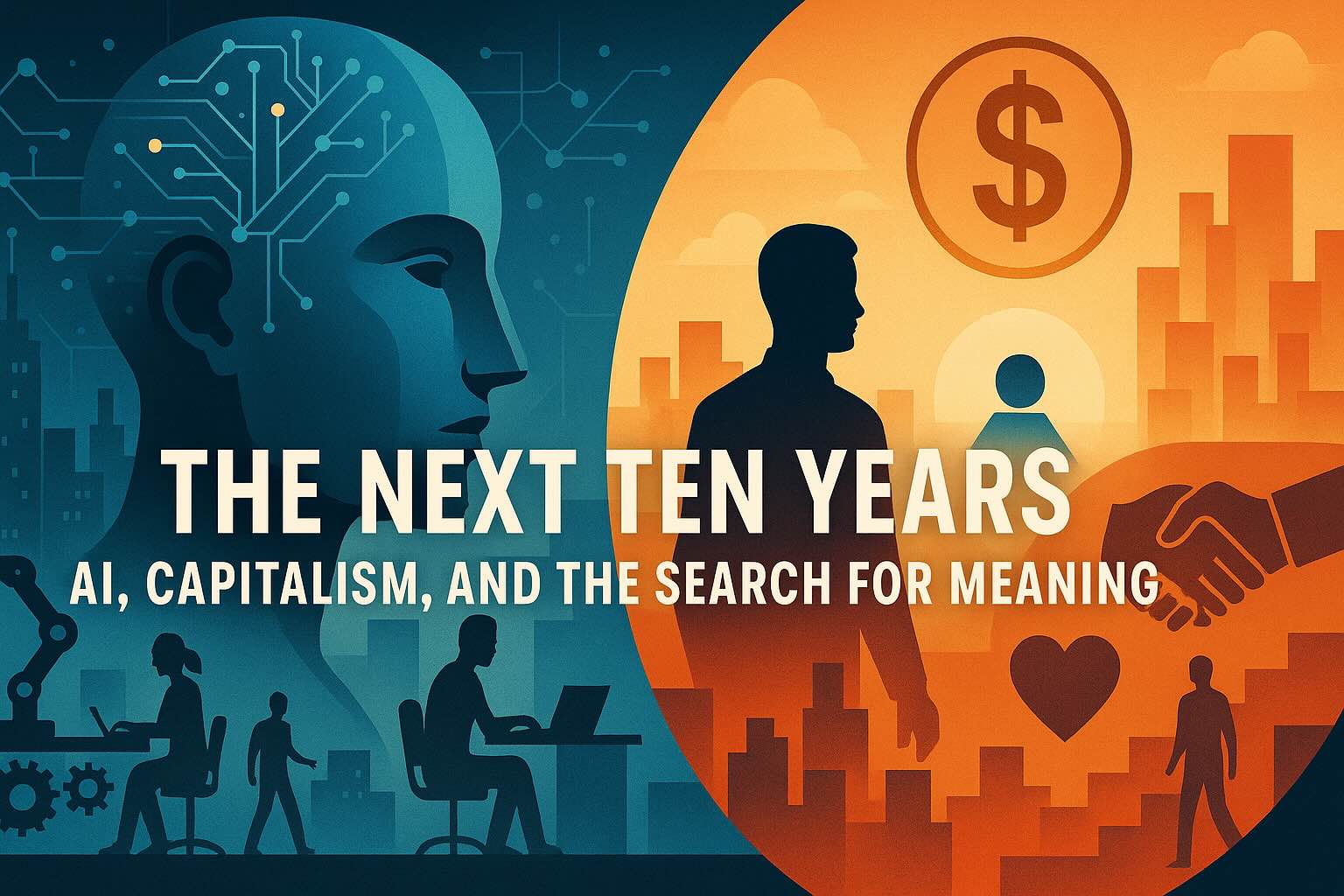The Next Ten Years: AI, Capitalism, and the Search for Meaning
The Next Ten Years: AI, Capitalism, and the Search for Meaning
As we stand at the threshold of a new decade, the accelerating development of artificial intelligence promises to transform the economic and social fabric of our world in ways that defy easy prediction12. The dominant narrative is one of exponential technological progress3. A story told in headlines about AI breakthroughs, automated workflows, generative models that blur the boundaries of art and authorship, and forecasts of abundance where digital goods are nearly free and services become universally accessible.
Yet beneath this surface optimism, deeper tensions simmer. The dream of abundance coexists with the reality of exclusion, and the old logic of scarcity. Who gets what, and why remains stubbornly embedded in our institutions and collective psyche. The coming years, far from being a simple march toward a utopian or dystopian future, will be defined by turbulence: social, economic, and political.
AI Everywhere, But Unevenly
By 2034, artificial intelligence will be as ubiquitous as the internet is today. Algorithms will quietly manage logistics, shape medical diagnostics, create personalized educational experiences4, and mediate creative work. For many, AI assistants, tutors, doctors, even therapists, will become as familiar as smartphones5. Yet this transformation will not be distributed equally6. Those with the best access to data, infrastructure, platforms and education will enjoy supercharged productivity and wealth, while others may find themselves increasingly marginalized.
The nature of work will continue to shift7. Full automation will not instantly sweep away traditional employment8, but the meaning of “work” will fragment9. More people will occupy gig, freelance, or “AI-assisted” roles, while stable careers become the exception rather than the rule. New jobs will emerge in fields related to meaning, care, and creativity, often enabled, but not replaced, by AI10. However, the risk of precarity will grow for many, and with it, the anxiety about economic security and social status.
Abundance and Scarcity, Side by Side
One of the paradoxes of the next decade will be the simultaneous proliferation of abundance and the persistence, sometimes deepening, of scarcity. Some goods and services, especially those that can be digitized, will become radically cheaper or even “post-scarce”. Educational content, medical advice, basic creative tools, these may be available to all at minimal cost. But new forms of scarcity will become central: attention, trust11, meaningful relationships, and a sense of belonging.
Meanwhile, the economic gains generated by AI will tend to concentrate. Without significant policy innovation, wealth and influence will flow toward those who own the “means of cognition”: platforms, data, and computation. Experiments with Universal Basic Income1213 or Universal Basic Services will expand, often as local pilots or temporary relief measures. But a broad, global safety net will likely remain out of reach. The political fight over redistribution, and what counts as “meaningful support,” will intensify.
The Meaning Economy and Its Discontents
As AI automates more tasks and strips away the economic necessity of certain types of work, also in terms of physical labor14, the question of meaning will come to the fore. People will seek purpose outside traditional employment: in community, the arts, advocacy, and new forms of collective identity. The “meaning economy”15 will flourish, with jobs and platforms devoted to curation, coaching, authenticity, and belonging. But this too will be commodified, and anxieties about “what is real” versus “what is manufactured” will proliferate.
For many, the loss of work as a central axis of identity may be liberating; for others, it will be disorienting. We may see a new wave of anti-tech populism, digital “Luddites”16 and social movements demanding a more human-centered, equitable digital society. The debate will not be only about material wealth, but about dignity, agency, and the right to a meaningful life.
Social and Political Instability
Rapid change rarely comes without backlash17. The next ten years will see political and social unrest as workers resist automation, as communities fight against perceived surveillance or manipulation, and as inequalities between and within nations become more visible. The regulation of AI will be a hotly contested field, with conflicts over privacy, misinformation, bias, and the role of platforms in shaping public life.
Hybrid Experiments and Uncertain Futures
Amid this turbulence, expect to see a proliferation of experiments: platform co-ops, digital commons, new value-tracking systems that attempt to recognize meaning and impact, rather than just price or scarcity18. These efforts will not replace capitalism overnight, but will gradually reshape its edges, creating new hybrid forms where markets, states, and communities all play a role in distributing resources and recognizing value.
No Simple Endgame
Despite the hype, the next ten years are unlikely to bring either a techno-utopian post-scarcity paradise or a total dystopian collapse. Instead, the era will be defined by messy hybrid realities, abundance in some domains, precarity in others; flourishing and anxiety side by side; constant experiments in what it means to live, work, and thrive in an age where intelligence and meaning are ever more intertwined with machines.
In this liminal space19, the defining question will be not just “what can AI do?” but “for whom, and for what purpose?” The search for meaning, for dignity, for inclusion and agency, will become as central to politics and economics as questions of efficiency or growth. The old metrics like GDP, productivity, even employment will start to give way, however imperfectly, to new ways of tracking what matters in people’s lives.
The next decade, then, will not be the end of history, but its intensification. A period where we collectively renegotiate the boundaries of value, meaning, and what it means to be human in the shadow of our most powerful technologies.
References
- https://www.darioamodei.com/essay/machines-of-loving-grace
- https://ia.samaltman.com/
- https://moores.samaltman.com/
- https://www.penguin.co.uk/books/460644/brave-new-words-by-khan-salman/9781802064896
- https://hbr.org/2025/04/how-people-are-really-using-gen-ai-in-2025
- https://link.springer.com/article/10.1007/s00146-022-01437-8
- https://papers.ssrn.com/sol3/papers.cfm?abstract_id=5188231
- https://en.wikipedia.org/wiki/Lump_of_labour_fallacy
- https://www.palladiummag.com/2024/05/17/my-last-five-years-of-work/
- https://www.weforum.org/publications/the-future-of-jobs-report-2025/
- https://world.org/world-id
- https://www.basicincomeconversation.org/about
- https://www.pilotprojekt-grundeinkommen.de/en
- https://www.youtube.com/watch?v=_2NijXqBESI&t=16s
- https://tamarahusher.medium.com/the-ai-uprising-reshaping-work-wealth-and-society-in-the-age-of-agi-242226563ad9
- https://en.wikipedia.org/wiki/Luddite
- https://situational-awareness.ai/the-free-world-must-prevail/
- https://hackernoon.com/universal-basic-income-the-value-of-post-scarcity-pt-2-5739b58a2ec5
- https://en.wikipedia.org/wiki/Liminality
